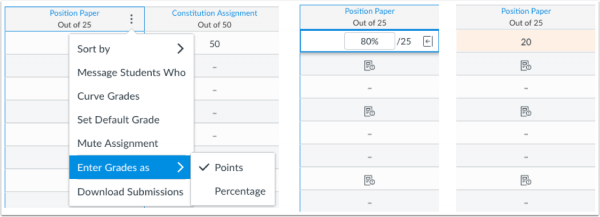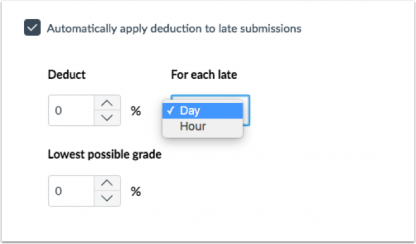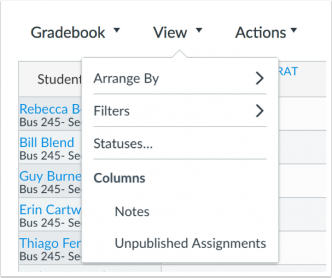
Contents:
- Sneak Preview: The New Canvas Gradebook
- Continuity and Change in the College Experience
Sneak Preview: The New Canvas Gradebook
NOTE: The new Gradebook will become the default in about one year. This is an overview of the changes to give you an idea of what’s in the works. Please keep in mind that new Gradebook is still being tested and refined, so the final product may be slightly different from what you see here.
In the new Gradebook you can…
Enter grades in any format, not just in the format set in the assignment:

Automatically reduce grades for late submissions:

Change Gradebook views (arrange assignments alphabetically, by points, by modules, and more):

The new Gradebook is an exciting change. There will be training and Q&A opportunities well in advance of the implementation date. And of course you can always contact the Office of Online Learning!
Continuity and Change in the College Experience
Twenty years ago, online learning was the subject of breathless hyperbole. Most of the hype – such as the impending demise of brick-and-mortar institutions, or the attrition of faculties down to a handful of superstar professors – proved to be exaggerated. Nevertheless, the ready availability of higher education untethered from a physical location has left its mark.
The academic community in general, and Community College of Philadelphia in particular, is witnessing a gradual shift towards the increasing prominence of online learning. Although some three-quarters of students in online classes also take on-campus courses, the change is perceptible in the statistics: where overall enrollment has gradually declined by a few percentage points in recent years, the percentage of students enrolled in online courses has increased by double digits in the same period of time.
Precedent suggests that it would be unwise to make sweeping predictions about the future of the College based on the trend of the past few years. Rather, I would like to explore what the shift that is underway suggests for the experience of being a college student, and how that experience can be deepened and enriched. In short, what does it mean to a member of an academic community when one’s face-to-face contact with that community maybe decreasing, and perhaps eliminated completely?
Online learning at CCP has a decisive advantage over completely online competing institutions in that we have a lively and vibrant campus. Moreover, each online course potentially represents an incremental increase in free time by eliminating commuting. How can these factors be leveraged to construct a college experience that is not just pragmatic and functional, but memorable?
The College offers a range of extracurricular academic and cultural events that give our students affordable access to the richness of America’s fifth largest metropolis. To CCP students, each of us represents and models what it means to be an educated person. We all have an obligation to lead by example and show our students that participation in enrichment activities is an intrinsic part of the life of the mind. A particularly exciting addition to this initiative is the promise of the new Library/Learning Commons: it will be what we make of it.
Many of us may fondly recall our college years as a time of intellectual freedom, exploration, and exposure to new ideas. As the very concept of a college evolves, our task as educators is to adapt and translate the best of that experience in a way that is substantively and democratically available to our students.
Regards,
Peter Margolis, MA
Director, Online Learning
Room B2-26
215.751.8702
pmargolis@ccp.edu
